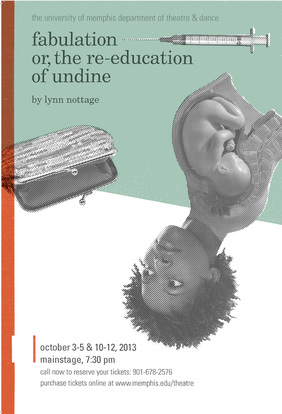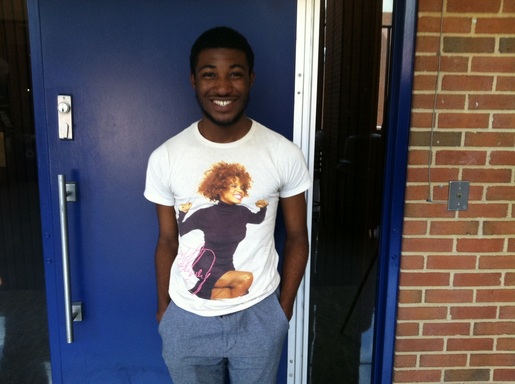 Photo artwork by Gary Golightly
Photo artwork by Gary Golightly Tristan Parks freely admits that theatre has become his “entire life.”
Whether working on the Oct. 5 premiere of "Fabulation, or the Re-Education of Undine," Parks, along with fellow cast and crew members, have good reason to refer to theatre as their entire lives.
“This is our first show in a long time that will primarily feature an all African-American cast,” Parks, a sophomore Bachelor of Fine Arts performance major, said. “It’s about recognizing who you are, your truth and not escaping that for the rest of your life.”
When asked why he decided to audition for the play, Parks admitted that he was really moved by the eccentricity of the characters, and how fun it was to play them.
“This play is satire; so while we are poking fun at the issues that go on in our community, it is this poking fun that helps us realize who we truly are,” Parks added.
The issues in question refer to an out-of-wedlock pregnancy, drug abuse and deadbeat spouses. These combine to form the riches-to-rags story of Undine Barnes-Calles, a successful Manhattan-based African-American publicist who finds herself in a perilous situation when she learns that her husband not only took her money and left, but she is pregnant with his baby.
Barnes-Calles is then forced to move back in with her working-class relatives in Brooklyn, where she must re-face the obstacles she encountered on her way up the ladder. She also learns a thing or two about herself in the process.
Stage manager Jake Lacher said that in addition to the aforementioned issues, audiences should also be aware that there will be some discussions of sexual themes present in the play.
“It’s nothing too extreme,” a theatre student clarified. “It’s a good show for parents to bring their kids to, but they should keep those issues in mind.”
Parks, who plays both of these characters, a drug dealer and an FBI agent, said that of these four personas, Flow is the one he relates to the most.
“With Flow, he’s very eccentric in the sense that he’s always ready to educate people about black history,” he said. “I’m sure we all have all met or know someone who is so passionate about wanting to educate people. That’s why I enjoy playing him so much because it’s nice to challenge who is just as passionate as I am, but in a different light. I’m not as educated when it comes to my own history; I do know bits and pieces of it, but Flow is that gateway for those who really want to get into black history.”
The only difference between himself and Flow, Parks noted, is the subjects they both are passionate about.
“While Flow is dedicated to educating others about black history, I am more devoted to my art,” he said. “I’m also passionate when it comes to performing in general, and I’m just always ready to work and learn. As artists, we’re always learning and people don’t realize that we work just hard as everyone else, if not harder. We don’t just get up on stage and perform and give you a show; it’s a process that takes time, and that’s another reason that I can relate to Flow more than the other three characters.”
Lacher said that so far, his favorite part of being a stage manager has yet to come.
“It’s when I get to call the show and see it all come together as one big unit,” he said. “Seeing the lights, sound, set and actors come together is probably the best part for me.”
Theatre professor John Yorke, who is the director of the play, said one of the things that spoke to him about the script was the idea of re-education.
“One of the things I love about being a teacher is that we are always coming back and learning something new,” he said. “We change if we embrace the changes that occur in our lives, and if we don’t do that, we get stuck. That’s the main obstacle Undine’s family cannot get past; they’ve met resistance in their lives and are unable to get past it.”
Because some of the faculty members have spent time in New York for a number of years, there were a few discussions about how some areas differed from others, Yorke said.
“Wherever we are in the country, we are the same,” he added. “We all face the same obstacles, and the same story could be told anywhere.”
Since its off-Broadway premiere at Playwrights Horizons in 2004, the play has garnered a multitude of reviews.
Jason Zinoman of The New York Times wrote that playwright Lynn Nottage sounded nervous when confronted with the fact that when a play becomes a hit, audiences and critics expect playwrights to write the same thing all over again.
“Who wants to see the same play over again?” Nottage told The Times. “I certainly don’t want to write the same play again and again.”
The Los Angeles Times, however, focused its attention to the characters and the plot line instead of the playwright during its 2010 premiere at the Lounge Theater in Hollywood.
In her review, Charlotte Stoudt wrote that “watching someone else’s comeuppance is such a pleasure,” and even referred to Nottage’s story as “rough around the edges, but it gets the job done.”
When asked what he hoped audience members gained from viewing the U of M’s production of Fabulation, Lacher’s response was simple: stay in touch with your roots.
“No matter where you go in life, you’ll always have that one identity and place to come back to,” he said.
Yorke hopes the audience will be entertained throughout the play, but pick up on the lessons being featured at the same time.
“I want them to have a good time, but I also want them to apply these themes in their own lives,” he said. “It’s a scary thing to be honest with oneself and let go from their past, but the main point is that with support from your loved ones, you can persevere.”
The play runs from Oct. 3 to 5 and Oct. 10 to 12 in the University of Memphis Theatre Building located at 3745 Central Ave. U of M students receive one free ticket per UM ID and the cost to non-students is $20 for adults and $15 for senior citizens.

 RSS Feed
RSS Feed